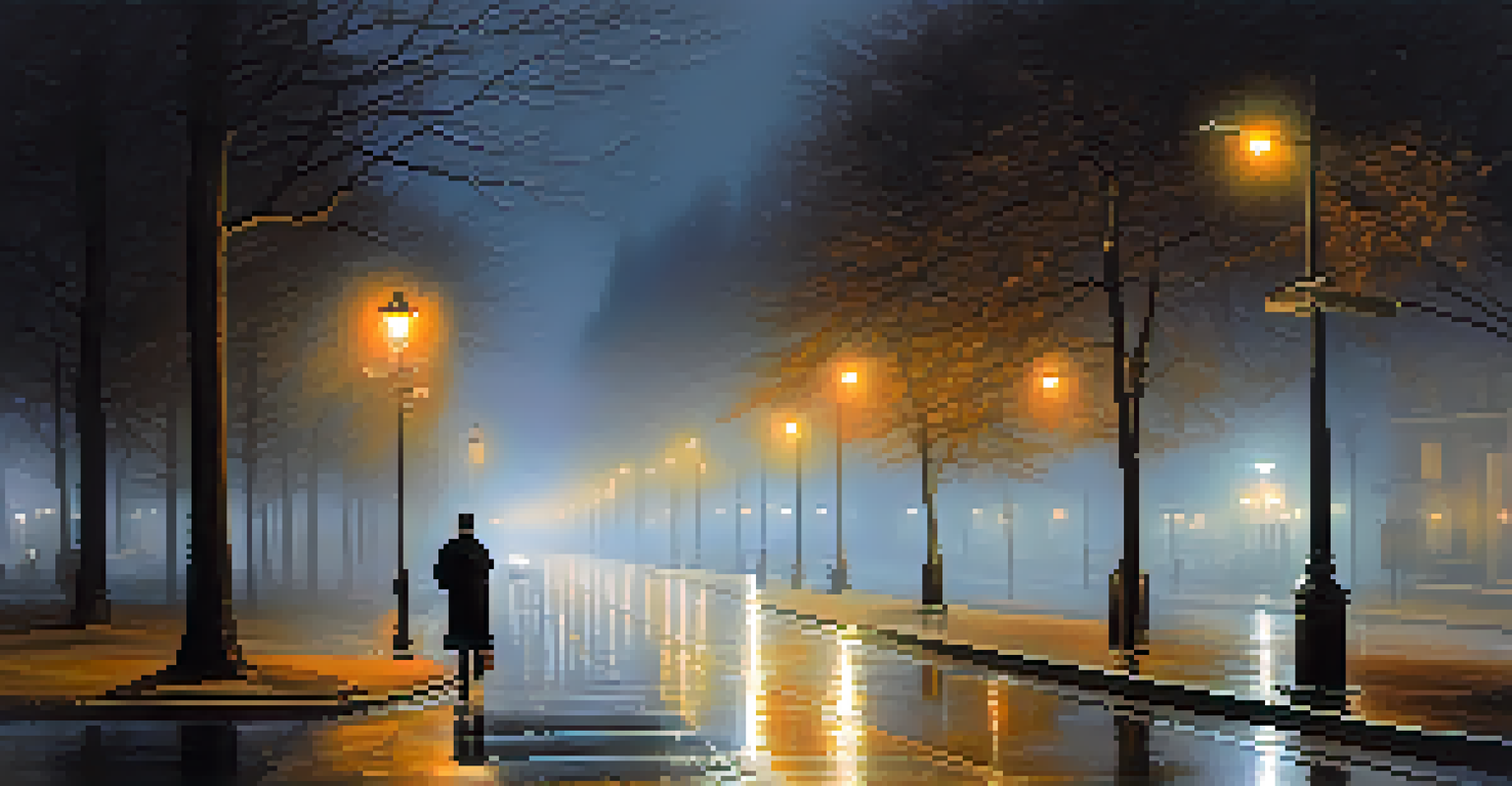Thrillers and Suspense: The Psychological Impact on Viewers

The Allure of Thrillers: Why We Love to Be Scared
Thrillers hold a unique charm that keeps audiences on the edge of their seats. The adrenaline rush we experience while watching is akin to a rollercoaster ride, filled with unexpected twists and turns. This thrill, coupled with our natural curiosity about danger, makes these genres irresistibly captivating.
The most terrifying thing is to accept oneself completely.
When we engage with suspenseful content, our brains release chemicals like adrenaline and dopamine, heightening our senses. This biological response not only enhances our enjoyment but also creates a sense of connection with the characters and their plights. We find ourselves rooting for protagonists, sharing in their fears and triumphs.
Ultimately, thrillers tap into a primal instinct: the need to confront fear in a safe environment. By exploring the darker aspects of human nature and life-threatening situations, we can confront our own fears without real-world consequences, making it a thrilling experience.
Suspense: Building Tension and Viewer Engagement
Suspense is the art of building tension, and it plays a critical role in engaging viewers. Filmmakers and authors use techniques like cliffhangers, slow reveals, and red herrings to keep audiences guessing. This constant uncertainty creates a gripping experience that compels viewers to stay invested in the narrative.

A classic example can be seen in Alfred Hitchcock’s films, where the tension often arises from what we don’t see. By withholding information, he forces us to speculate, making our imagination work overtime. This engagement keeps our minds racing and our hearts pounding, which is precisely the goal of suspense.
Thrillers Evoke Strong Emotions
The adrenaline rush and emotional rollercoaster we experience while watching thrillers heighten our engagement and connection to the characters.
As the tension escalates, viewers experience a mix of emotions, from anxiety to excitement. This emotional rollercoaster is what makes thrillers so memorable and impactful, as we often find ourselves reflecting on these feelings long after the credits roll.
Psychological Effects: Fear and the Fight-or-Flight Response
Watching thrillers triggers our fight-or-flight response, a survival mechanism designed to prepare our bodies for danger. This physiological reaction can lead to increased heart rate, heightened senses, and a rush of adrenaline. While it may sound daunting, many viewers find this thrilling—literally—because it amplifies the emotional experience.
We are all afraid of the dark, but we are all afraid of the light as well.
Moreover, this response creates a sense of catharsis. By confronting fear through the lens of fiction, we can process our own anxieties and fears in a controlled environment. This can lead to a feeling of relief and even empowerment, as we navigate intense situations without any real danger.
Interestingly, repeated exposure to fear-inducing content can also desensitize viewers over time. While this may sound concerning, it can actually help individuals cope with real-life stressors, as they become more accustomed to managing their emotional responses.
Empathy Through Characters: Understanding the Unthinkable
Thrillers often feature complex characters facing moral dilemmas and extreme situations, allowing viewers to explore the depths of human psychology. By stepping into the shoes of these characters, we gain insights into their motivations, fears, and vulnerabilities. This connection fosters empathy as we begin to understand actions that may seem unthinkable in everyday life.
For instance, films like 'Gone Girl' or 'Se7en' present characters whose motivations are layered and multifaceted. As we watch their stories unfold, we grapple with our own values and assumptions about right and wrong. This exploration of morality adds depth to the thrilling experience, making it more than just entertainment.
Suspense Keeps Audiences Hooked
Techniques like cliffhangers and slow reveals create tension, compelling viewers to stay invested in the narrative.
In essence, thrillers challenge us to confront uncomfortable questions about human nature. This not only enhances our viewing experience but also encourages personal reflection, making the impact of these stories resonate beyond the screen.
Cultural Reflections: Thrillers in Society
Thrillers often reflect societal fears and anxieties, making them a mirror to the culture in which they are created. From political thrillers that tap into fears of corruption to psychological thrillers that explore mental health, these narratives can spark important conversations. They allow us to examine our collective consciousness and the issues that matter most.
Take, for example, the rise of psychological thrillers in the wake of societal changes, such as increased awareness of mental health issues. Films like 'Black Swan' and 'The Silence of the Lambs' delve into the complexities of the human psyche, prompting viewers to consider the impact of trauma and isolation.
Through these stories, we not only entertain ourselves but also engage with critical themes that resonate with our lived experiences. This cultural relevance is part of what makes thrillers so impactful and enduring in the cinematic landscape.
The Aftermath: Lasting Impressions of Thrillers
The psychological impact of thrillers doesn't end once the credits roll; in fact, it can linger long after viewing. Many viewers find themselves reflecting on the themes and emotions evoked by the story. This introspection can lead to a deeper understanding of personal fears, relationships, and societal issues.
Moreover, the experience of watching a thriller can initiate discussions among friends and family. Sharing thoughts about the film's twists, character motivations, and moral dilemmas creates connections and fosters critical thinking. This social aspect enhances the viewing experience, making it a shared journey rather than a solitary one.
Cultural Reflections in Storytelling
Thrillers reflect societal fears and anxieties, prompting important conversations about issues such as mental health and morality.
In this way, thrillers serve not only as entertainment but as a catalyst for dialogue and self-reflection. Their ability to provoke thought and conversation is what solidifies their place in our cultural fabric.
Conclusion: The Enduring Legacy of Thrillers and Suspense
As we’ve explored, thrillers and suspenseful narratives have a profound psychological impact on viewers. They engage our emotions, challenge our perceptions, and invite us to confront fear in a safe space. This unique ability to elicit a range of reactions—from fear to empathy—ensures the ongoing popularity of these genres.
The legacy of thrillers is evident in their evolution over time. Today, we see a blend of traditional elements with modern storytelling techniques, making them more relatable to contemporary audiences. This adaptability is key to their enduring appeal, as filmmakers continue to push boundaries and explore new themes.

In the end, whether you're a casual viewer or a die-hard fan, the psychological impact of thrillers and suspense is undeniable. They offer not just entertainment but a chance to explore the complexities of the human experience, making them a vital part of our storytelling tradition.